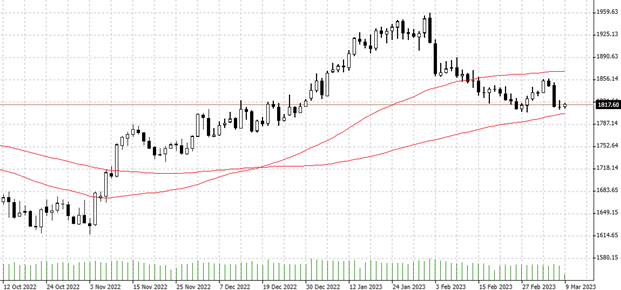

09.03.2023 – Most of the time, the reasons for a price movement only become clear afterwards. Especially in relatively small markets like gold. A fact has just become known that has largely been lost in the mainstream media: Singapore was busy buying gold in January. This special factor supporting the price has now fizzled out for the time being. In addition, higher interest rates are slowing down the gold price.
Let’s first look at the daily chart. The analysts of “FXStreet” commented, bearish traders must wait for a sustained break of the round mark of 1,800 dollars. We add: Below that, the 100-day moving average is support – that’s the line below. According to “FXStreet”, a short-covering rally can take gold to the one-month high at 1,858. However, the 50-day moving average at 1,869 could stop the upward movement.

Source: Bernstein Bank GmbH
And so back to the fundamental facts. The gold blog “BullionStar” has been paying attention: The Monetary Authority of Singapore (MAS) has returned to the market as a buyer – purchasing 44.6 tons of gold in January alone. Holdings rose from 153.8 to 198.4 tons. A nice plus of about one third. The purchase was the second largest monthly deal ever, only in 1968 Singapore had bought more yellow metal from South Africa with 100 tons. The purchase took place quietly, only on the website of the MAS the figures were updated, according to “BullionStar”.
Monetary guardians rely on gold
This fact is interesting because it means that another central bank is betting on precious metal. As we have already reported here, China, Russia and Turkey also bought diligently in the past year. This is another indication that the world’s central banks either believe in sustained inflation and want to hedge against the decline in the value of paper money with precious metals. Or the monetary guardians expect a deflationary crash, in which case gold would also be a safe haven. In any case, the buying shows us that gold is a long-term bet for central banks.
Higher interest rates put the brakes on
Of course, there is also another bearish factor that is slowing gold down: interest rates are rising everywhere. The Federal Reserve, in particular, is rushing ahead. Precious metal doesn’t yield interest, and it costs too – fees to store it at the bank or to install a safe at home. We are curious to see which factor will prevail in the market. Whether long or short – Bernstein Bank wishes successful trades and investments!
____________________________________________________________________________________
The content of this publication is for general information purposes only. In this context, it is neither an individual investment recommendation or advice nor an offer to purchase or sell securities or other financial products. The content in question and all the information contained therein do not in any way replace individual investor- or investment-oriented advice. No reliable forecast or indication for the future is possible with respect to any presentation or information on the present or past performance of the relevant underlying assets. All information and data presented in this publication are based on reliable sources. However, Bernstein Bank does not guarantee that the information and data contained in this publication is up-to-date, correct and complete. Securities traded on the financial markets are subject to price fluctuations. A contract for difference (CFD) is also a financial instrument with leverage effect. Against this backdrop, CFD trading involves a high risk up to the point of total loss and may not be suitable for all investors. Therefore, make sure that you have fully understood all the correlating risks. If necessary, ask for independent advice. CFDs are complex instruments and are associated with the high risk of losing money quickly because of the leverage effect. 68% of retail investor accounts lose money trading CFD with this provider. You should consider whether you understand how CFD work and whether you can afford to take the high risk of losing your money.7
